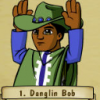So, a little backstory. I am a fresh college graduate. I just landed my first job working as a developer for an indie startup mobile games company. Their main tool of choice is Cocos2Dx, which I am still in the process of learning (awesome framework).
Previously and independently, I've studied game programming for about 4+ years now (since high school). I've studied DirectX, Unity3D, and UDK by doing some very small educational projects, one of which ended up as my final year project, which impressed my current employers (my parents weren't that impressed. They still think that I play Atari all day) enough to land me a very decent-paying job in the first place. A few white lies were inserted here and there to get the job, but honestly, who hasn't done that ??
Anyhow, apparently I've liked game programming enough to stick with it for 4+ years, 5-6 days a week, aside from my school work. I honestly love coding in C++, C#, and other beautiful scripting languages like Lua and Unrealscript (ah...good ol' Unrealscript....).
My problem is that I don't really know where I can move forward from there. I know my question is a bit vague and too early to ask, but what is the future of a game programmer in the industry ??
Do you just keep learning new systems and languages forever ??
Do you become a developer or a designer in a AAA game studio or just stay in the indie scene ??
What is the natural next move ??
I hope some of the veterans here can help clear the smoke.











